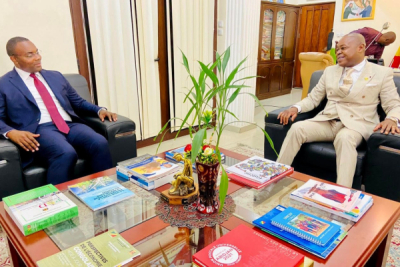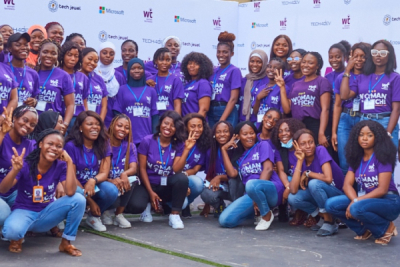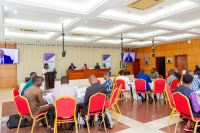
Brief_One (95)
Last Monday, LinkedIn announced a reorganization of its global sales organization and China strategy. The decision involves the reduction of roles for 716 employees and the phasing out of its local China jobs application, InCareer, by August 9. The decisions stem from the group’s desire to adapt to the changing market, and customer demand as well as become more agile and align teams for its next growth phase.
"As we plan for FY24, we’re expecting the macro environment to remain challenging. We’re adapting as we have done this year and will continue to operate with the ambition we need to deliver on our vision and the pragmatism required to run the business well," wrote Ryan Roslansky, LinkedIn's CEO.
In Nigeria, the National Information Technology Development Agency (NITDA) and the National Youth Service Corps (NYSC) recently partnered to develop the digital economy. The partnership aims to develop the digital economy in Nigeria by increasing awareness and encouraging the youth to adopt emerging technologies. Under the agreement, training will be offered to youth corps members interested in advanced technologies such as artificial intelligence and robotics.
Last weekend, Congolese Minister of Posts and Telecommunications Leon Juste Ibombo (photo, right) granted an audience to Guinean Minister of Transport, Evita Oma Honorato (photo, left).
The two officials discussed future agreements to develop the ICT sector in their respective countries. The envisaged cooperation will focus on mobile money interoperability and the implementation of the Oyola training project.
The PAYAIG (Pan-African Youth Ambassador for Internet Governance) initiative developed by Cyber Czar and supported by the British government announced, Tuesday (May 2), the opening of applications for its Internet governance program in Africa.
Applicants must be between 18 and 30 years old, reside in any African country, be able to communicate effectively in one of five languages: English, Arabic, French, Portuguese, or Swahili, and be motivated by Internet governance. The deadline for applications is May 19.
Last Saturday, the Commodity Futures Trading Commission (CFTC) announced an order requiring Cornelius Johannes Steynberg, CEO of South African company Mirror Trading, to pay $3.4 billion over bitcoin fraud. Specifically, Steynberg will have to restitute in excess of $1.7 billion to defrauded victims and pay over $1.7 billion in civil penalties.
Non-profit organization Tech4Dev recently announced the launch of its Women Techsters initiative, aimed at providing scholarships for a virtual learning program to girls and women in Africa.
The program will equip participants with skills in blockchain, cybersecurity, data science, and artificial intelligence engineering, mixed reality/3D animation, mobile app development, product design (UI/UX), product management, and software development.
African women between the ages of 16 and 40 interested in the program are invited to apply by May 27.
Last week, the Beninese IT development agency ASIN organized a workshop to review and update the national cybersecurity strategy.
This mid-term review gave digital actors the opportunity to lay the foundations for the coming update, which aims to respond to the new challenges arising from the evolution of digital uses and related threats, three years after the strategy was launched.
Waves of layoffs are multiplying in major American tech companies. In November, Meta set the tone by cutting 11,000 jobs, and others have followed. Since the beginning of 2023, over 210 tech companies have laid off 68,000 people, mainly in the United States."
Digital technologies are still widely underutilized in microenterprises in Sub-Saharan Africa despite their huge potential for productivity gains, according to a report published on January 23rd by the World Bank. The main factors that prevent African microenterprises from using computers, smartphones, or stock management software on a large scale are the lack of information about these technologies, insufficient digital skills, the high cost, and the lack of suitable infrastructure.
The Zimbabwean government has announced that it plans to deploy over 300 base stations across the country this year to address connectivity issues, particularly in rural areas. The equipment needed to build these telecoms infrastructures has already been purchased, it has been learned. Installation and operation will be entrusted to NetOne, the mobile branch of the historic operator TelOne. " We have sent in our team to conduct mapping and scoping and we want to make sure that we connect the unconnected." said Jenfan Muswere, Minister of Information, Communication, Technology, and Postal and Courier Services.
More...
According to Muriel Edjo, Chief Editor at We Are Tech, Africa is adopting 5G faster than expected, but not yet fast enough to meet the exploding demand for connectivity driven by new uses such as videoconferencing, streaming, e-sports, e-health, and remote work. Not to mention the rapid progress of AI and the growing importance of data that are disrupting the economy and public administration. Most of the major African telecom operators are ready to deploy this technology on a large scale. But they face several obstacles that the report "5G in Africa: The Challenges Facing Telecom Operators" aims to identify.












